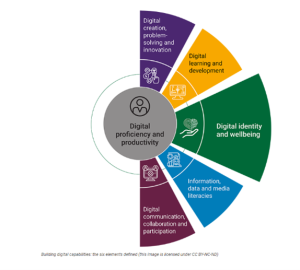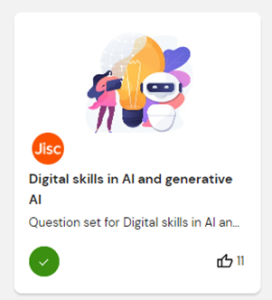When you come to the end of your working life and are facing a shift and change of pace, it’s often a good time to stop and reflect on what you have been doing and what has really impacted across your career. In 2017, due to a drop in student numbers, I was one of the early casualties of a restructure at the University of South Wales, where I had worked for 15 years. I then moved to a small village in Eryri (Snowdonia), expecting to spend the rest of my working life volunteering for a local charity. Just five months after arriving in a beautiful mountain valley, four miles South West of Yr Wyddfa, I started working for Jisc. The last six years have been interesting, exciting, challenging, different and formative. I’ve had four roles within Jisc during that time. The last two years have been spent looking after digital capabilities and in developing the Jisc Building digital capabilities service (BDC).
The BDC discovery tool allows staff and students to reflect on their digital capabilities using our capability framework and helps to:
- Identify current strengths and areas for development
- Provides a personalised report with suggested next steps and resources
- Surfaces organisational development opportunities
- Provide a clear data picture of how users feel about their digital skills within the organisation via a dashboard
So as I look back on what we’ve achieved over the last two years I’d like to answer the question…
‘Why would you maintain and deploy BDC as a service within your organisation ?’
The interest in our product, and its ability to support both staff and students to ensure that their digital skills are both identified and developed, remains high. We are so encouraged when we talk to people who are aware of the needs within their organisation to both manage and enable digital transformation and can see how easily BDC will fit into their organisational structures and deliver a manageable, practical tool to provide a viable solution to support personal development.
Currency – regular new content and feature enhancements added
Reflecting on the service developments that we have seen just within the last 12 months, I am so proud to share what we have achieved
- New question sets that support ‘AI and digital skills’ for both staff and students
- Refreshed individual capability framework with the inclusion of AI and generative AI elements
- The development of a new role profile to support educational technologists (release July 2024)
- The release of a new question set ‘Recognising digital skills for employability on May 28 this year
- A refreshed and updated user experience that makes the tool even easier navigate with optimised mobile device accessibility
Community – shared experiences
I couldn’t ask for a better or more dedicated team supporting the developments and improvements of the product, as well as providing individual support to all our customers.
The team have delivered numerous seminars and workshops, presentations at conferences including Digifest24, UCISA, ALTC23 as well as presentations at an organisational level in the last year – many of these have been delivered in conjunction with a successful customers. This includes a bi-annual joint community of practice with Digital Experience Insight users, regular webinars and a MS teams community site.
Value for money based on organisational headcount
Currently we have over 260 organisations who use the service not just across the UK, but also internationally. I may be biassed but I genuinely believe that BDC is probably one of the most cost-effective services that any organisation could implement to support staff and students in assessing their digital confidence and then helping them, through the use of a significant bank of resources, to further develop their digital skills.
For an average sized organisation of 10,000 staff and students, the cost of the service can be less than the equivalent price of 3 well known frog shaped chocolate bars per head! Where else could you get such a return on a small financial investment with the provision of personal development reports, expert support, curated resources and organisational data insights?
Supported implementation journey
Of course it’s not just about the cost of the software, but it is the time and the resources needed to implement a solution across a complex organisation which many find difficult. Not just implementation but maintaining interest and engagement with the various self-assessment question sets within the service. Whilst this may initially look frightening and a large task, with the clear support offered by the digital capabilities alongside buy-in from key stakeholders with influence within the organisation, implementation doesn’t need to be viewed as daunting. Those organisations who have implemented with a ‘Big Bang’ philosophy have often seen surprisingly positive results, even going so far as to mandate the completion of at least one of the self-assessment question sets within a set time. This possibly goes against the grain within organisational structures where decisions are made by committee, who like to do a proof of concept, pilot and slow release but the evidence speaks for itself and taking bold steps in difficult times is often the way to achieve significant success as shown by Leeds Trinity University case study
Data Insights – analyse and benchmark
One of the most exciting things for me is to look at the data that comes out of the engagement, at an organisational level, with the question sets. Identifying bursts of activity which can be related to campaign or implementation activity show that the deployment is working well. The data picture that starts to build over time
- Allows for the identification of focus areas for strategic development
- Identifies areas within the organisation that may need extra attention or focus
- Enables organisations to identify areas of digital skills to celebrate and areas that need appropriate action taken
The ability to benchmark the data within the sector adds credence to both supporting individual development needs, as well as identifying organisational strengths.
A parting wish
In my last few weeks working for Jisc I’d encourage you to consider how important staff development is to your organisation, how much you value and want to support your students in developing their digital skills and preparing for their future. If you want to find out more or have a chat with us please Get in touch | Building digital capability (jisc.ac.uk)



